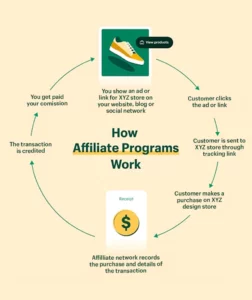
Join Now Adidas Affiliate Program...
August 6, 2024

Are you thinking of starting an affiliate Marketing program but heard conflicting opinions about what to expect and are not sure what to believe? You’re not the only one!
There are quite a few affiliate marketing myths and affiliate program misconceptions out there. Every new meeting with a new or potential client reveals at least one for us, so it seemed the right time to review and clarify some of the most common:
One of the most common affiliate program misconceptions among merchants refers to affiliate networks and the services they provide. Many merchants mistakenly believe that if they start their affiliate program on a network and pay an integration fee, the network will manage it for them. Unfortunately, while some affiliate networks provide management solutions, those need to be retained separately. As we explained in an older post, Affiliate Networks Provide the Infrastructure. Management Is Separate.

Some merchants believe that, if they build affiliate programs on several affiliate networks, they will get more affiliates and more sales. That could be true for merchants selling worldwide. For them, it could make sense to have separate affiliate programs for the U.S., Europe, and even Asia.
For a merchant targeting the U.S., one affiliate program on one of the major networks, like Upleadsdigital, Impact, octaadsmedia, or Rakuten should be more than enough. The choice should take into account the number of advertisers and publishers and what competitors do. The more advertisers and publishers are on the chosen network, the better. More competitors on a specific network mean more relevant affiliates.
There’s also the option of starting an in-house affiliate program with affiliate tracking software solutions like Tapfiliate, Refersion, etc. Either way, having only one affiliate program brings about several benefits:
Double-dipping is one of the most important aspects to consider. Buyers are often influenced by several affiliates (learn about the brand from a media publisher, read reviews, find coupons). If those affiliates are on different networks, chances are each of them will get credit for the sale on the network they’re on.
Merchants who manage their affiliate programs closely will catch the duplicate entries and reverse some of the commissions. Those who don’t manage their program closely will pay two or three times for the same sale. But reversing commissions is not a viable long-term solution either. It negatively impacts affiliate program statistics and can ruin the relationship with the affiliates in question.
Many merchants fall prey to this affiliate program misconception. Because they provide free products for affiliates to review or pay commissions, they try to control how affiliates rate and present their products. Yes, it’s fine to suggest approaches and placements, provide product information, feedback, and highlight selling points. However, at the end of the day, affiliates control their content, and it’s important to respect their decision.
Merchants who want more control or better placements need to motivate and incentivize affiliates. That can be done through:
All these will contribute to higher affiliate earnings per click (EPC). Most affiliates nowadays rank merchants based on affiliate EPC. Merchants who want more exposure and better placements should focus on increasing their affiliate’s EPC and leave any control attempts aside. In a successful affiliate program, the merchant and the affiliate are partners sharing a common goal: more valid sales and commissions.
We’ve had quite a few merchants reach out to us to launch and manage their affiliate programs immediately after launching their online stores. It is true that an affiliate program benefits most businesses. However, not all businesses are ready to start affiliate programs. There are a few scenarios when it is better to wait. There are also certain steps all merchants should follow before investing in affiliate marketing. We covered them all in our post on 10 Scenarios When You Should NOT Start an Affiliate Program.

Indeed, by definition, affiliate marketing is performance-based, merchants only pay for results. However, in order for affiliates to drive those results, some upfront investments are often required. Examples include:
Yes, affiliate marketing is largely performance-based and allows merchants to control costs and return on investment. However, merchants who want to build successful affiliate programs should forget affiliate program misconceptions like the above and remain open to upfront investments.
I’ve seen quite a few affiliate management agencies and managers perpetuate such affiliate program misconceptions just to get another client. They promise 500% growth or even more from the first month, but what merchants don’t realize is that 500% of 1 sale is 5 sales. A responsible affiliate program manager will clarify that the results they can drive depend on several factors:
In affiliate marketing, results don’t come overnight, and no responsible affiliate manager will promise them. Sure, there are fortunate circumstances when the stars align and a super affiliate activates immediately and influences others to do the same. That’s every merchant and every affiliate program manager’s dream.
However, merchants starting an affiliate program should understand that they’re making a worthwhile but long-term investment. Depending on the above-listed factors, it can take several months before an affiliate program becomes profitable. It is better to have realistic expectations than count on exceptions and get discouraged when they don’t occur.
Many merchants adopt the “set it and forget it” approach. They mistakenly believe that, once their affiliate program is set up and starts driving results, it no longer requires management. Others assume that any employee can manage and grow the program. We explained how merchants can grow their affiliate programs here.
Unmanaged programs don’t grow by themselves. On the contrary, lack of management can ruin an affiliate program. It can reverse months of work and cause the merchant to lose valuable partners and incur financial losses. Unfortunately, many merchants only realize this when it’s already too late.
Some find their affiliate programs infested with unscrupulous affiliates who prey on their brand name and resort to deceitful advertising. In many unmanaged programs, coupon affiliates “steal” sales from content affiliates and discourage the latter from promoting the brand. Quite often, merchants realize they’ve been paying commissions on fraudulent sales when it’s too late to reverse them.
I’ve also seen merchants discover that their affiliate program went offline due to a failed payment months after it happened, costing them hundreds of sales and several valuable affiliates. Businesses don’t become successful by themselves. They need someone to steer them in the right direction, manage costs, stocks, partnerships, etc.. The same applies to affiliate programs – they need dedicated affiliate program management.
Have you come across such affiliate program misconceptions or know of any that we missed? Share your experience and thoughts in a comment below!
Leave A Comment